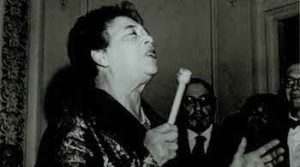
Mabel Mercer
*Mabel Mercer was born on this date in 1900. She was a Black British cabaret singer.
From Buron-on-Trent, England, Mercer’s father (a Black jazz musician) died before she was born. She spent her early years in England with her mother and various actresses. As English vaudeville performers, her mother and stepfather were usually on the road. At around age seven, she was sent to a Catholic convent school and remained a devout Catholic all her life. She quit school at age 14 and joined her aunt Rhoda King's vaudeville act. She worked as a teenager in several vaudeville/minstrel-type shows, including a couple of all-Black shows, such as Spades and Diamonds, Colored Society, and The Chocolate Kiddies.
To get work, she also did a few stints as a male impersonator, including one as an orchestra conductor. After the Armistice, she traveled throughout Europe, including Belgium, where she saw her first Black band. This was in the early 1920s, and Europe had just met and immediately fallen in love with what the French called le jazz hot. Around the same time, she started voice lessons (she was a mezzo-soprano), hoping to become a concert singer. While in London, in 1927, she got a small part in Show Boat, which starred the thirty-year-old Paul Robeson.
As a cabaret/saloon singer, she didn't just sing for her audience; she gave cabaret concerts, as it were. By the late 1920s, Mercer had pretty much settled down in Paris, where she ran into her first experiences with racism, which were to plague her for most of her life. In 1931, a turning point in her life, she went to work for Bricktop, helping to run her famous club at 66 Rue Pigalle. She met Josephine Baker, the Windsors, Ernest Hemingway, Gertrude Stein, F. Scott Fitzgerald, Vincent Youmans, and Duke Ellington, among many other notables. Django Reinhardt was fascinated by her and wrote a song, Mabel, in her honor.
She developed and perfected the intimate "cabaret" style she invented in Paris. She knew how to "tell" a song as much as sing it, to make the audience understand and appreciate the story of the lyrics as much as the music. She was an actress almost as much as a singer. There was something maternal and sustaining about her bond with the audience. Perhaps because she was childless, she adopted her audiences as her children. By 1938 she was forced to leave Paris because of the Nazi threat and came to America, where she encountered Jim Crow.
Even though she worked downtown, she was forced to live uptown in Harlem. She got her first American job at Le Ruban Bleu, on East 56th, owned by Herbert Jacoby, another expatriate and escapee from the Nazis. New York was her home base for the next forty-five years, although she occasionally ventured outside of Manhattan for work or awards, including The Medal of Freedom in 1983. In the 1940s, she got a job in the Bahamas, but when the war ended, she found herself stuck there, unable to return to America since she was legally an alien (she didn't become a citizen until 1952). To return to the States, she arranged a marriage of convenience to an openly gay Black Southerner, Kelsey Pharr. Although they remained good friends, they never lived together and hardly saw each other. But as a devout Catholic, Mabel refused to divorce Pharr and remained legally married to him until he died.
The 1960s were mostly lean times for Mercer, as they were for jazz and cabaret generally, but by the summer of 1968, things picked up when she and Bobby Short appeared in the now-legendary concerts at Town Hall in New York. In 1960, she was booked for a month-long engagement at the Chicago Playboy Club's Library, where she appeared on one of the then-popular Playboy late-night TV jazz shows. There are two videos of Mercer performing, both recorded in the early 1980s during her long stint at Cleo's.
Among her earliest and rare recordings is a couple she made in 1946 with Bart Howard. In the early 1950s, she went a more mainstream style, with Atlantic including Songs by Mabel Mercer Vols. I thru III, Mabel Mercer Sings Cole Porter 1956, and The Art of Mabel Mercer, 1957. Because of who and what she was, Mercer isn't well known. But any reissue is most welcome for those who knew of her and her music and those who are just about to meet her. Mabel Mercer died in 1984.
Black Women in America An Historical Encyclopedia
Volumes 1 and 2, edited by Darlene Clark Hine
Copyright 1993, Carlson Publishing Inc., Brooklyn, New York
ISBN 0-926019-61-9